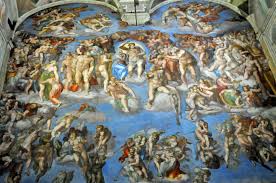
I have discovered the trick behind getting my body to run is learning not to listen to it. A few strides into the run, my heart and my stomach both claim I must stop or they will revolt…I must ignore the voices inside and keep running. In the same way, we have to ignore the nagging voice that beckons us to quit when we are doing right. It is possible to grow weary in well doing, and that is why Scripture warns us concerning it.
Key Principle: When we join the corps of the unfaithful because we feel they are stronger – we lose our distinctive call.
An hour and a half’s drive north to the impregnable high cliff city of Pergamum, where the tolerance of error was eroding the truth to a dull and compromised lump.
Revelation 2:12 “And to the angel of the church in Pergamum write: The One who has the sharp two-edged sword says this: 13 ‘I know where you dwell, where Satan’s throne is; and you hold fast My name, and did not deny My faith even in the days of Antipas, My witness, My faithful one, who was killed among you, where Satan dwells. 14 But I have a few things against you, because you have there some who hold the teaching of Balaam, who kept teaching Balak to put a stumbling block before the sons of Israel, to eat things sacrificed to idols and to commit acts of immorality. 15 So you also have some who in the same way hold the teaching of the Nicolaitans. 16 Therefore repent; or else I am coming to you quickly, and I will make war against them with the sword of My mouth. 17 He who has an ear, let him hear what the Spirit says to the churches. To him who overcomes, to him I will give some of the hidden manna, and I will give him a white stone, and a new name written on the stone which no one knows but he who receives it.’
The church of Pergamum had some critical issues of compromise of purity. Some supported seductive teachings that drew the weak away in forbidden food and immoral practices. These appear to have been focused on Christian “liberties” without restraint. Not everyone was involved, but a few dominated the many tolerated. That is the temptation now – to allow the voice of the world to become accepted as the voice of God’s people.
Habits for a Healthy Heart:
First, renew your hunger for the Word of God – it will make you resilient when you are getting worn out.
Jesus explains Who He is in Revelation 2:12 “The One who has the sharp two-edged sword says this…” Why does He use this title of Himself? In Scripture, the image of the sword of the Spirit, which is the word of God, is well known both in this book and in the rest of the Christian Scripture. John used the title “Jesus is the Word” in the opening of His Gospel account, in the same way that he called Jesus the Lamb. Think about Jesus as the Word for a moment…As such, He is sharper than any two-edged sword, and which lays bare the thoughts and intents of the soul (Ephesians 6:17; Hebrews 4:12). Literally that means that Jesus as the Living Word and the written word both share the capacity to cut into us with truth and divide “why I say I do something” from “why I really do something”. I have in my hands a tool that can do surgery upon my heart and expose trouble I cannot see without the help of this Word.
At the same time, this is the weapon with which Christ will subdue His enemies; a weapon that is provided to no carnal weapon is needed (2 Corinthians 10:4). Those who attempt to stand with any other sword in hand than this to advance His kingdom will perish with the weapon to which they have appealed (Revelation 13:10; Matthew 26:52), which reminds us the church’s growth and advance is to be thoroughly Word-soaked and Word-based. I mention that because there are many ways to draw a crowd and seemingly grow a church – but none that will sustain them like the careful and systematic teaching of the Word of God. The Scripture claims that those who arm themselves with this will find the Word mighty through God. In fact, Scripture is clear that with this weapon Jesus fights against His adversaries (Revelation 19:15, 21); and and makes deliberate wounds that He may heal. The One Who is the Word of God is the Living Incarnation of God’s powerful sword – both a weapon and a tool that brings victory, protection and correction to His followers.
He is the One Who was reaching out to the compromised and exhausted church. What do erring believers need? They need to be lovingly confronted with the Word – Who is personified in Jesus.
Dorothy Sayers wrote, “If men will not understand the meaning of judgment, they will never come to understand the meaning of grace.” This is why GUILT is being slain in our culture by accepting that none of us can be expected to do right. What does a 55 speed limit sign mean? “You can go 60 without getting stopped! What is April 15th? “The day you file for an extension!” Why do we not teach abstinence only in our classrooms? “Because young people cannot be expected to overcome their urges with the will to do right!” The only way to resolve the issues of sin without a Savior is convince our culture they aren’t sinners after all – they are normal for violating standards and the actual problem isn’t them – it is the judgmental people who have standards.
We must remember that if Jesus is clearly explained – He will be offensive to the world, but He will draw men to Himself. If Jesus is carefully examined in the Word for all His claims and His expectations – most will recoil at the idea of bowing before Him – but some will choose to drop to their knees in response. Our job is to clearly show Jesus to the world by exposing what God has revealed in His Word. For that reason, the enemy has pounded away at the deliberate transmission of the Word. Academics question its veracity. Scholars speak with such great complexity about its pages so as to confuse the convinced. Yet those who know its pages well have come to trust it MORE, not less.
We live in a time when new methods – one after the other – have been promoted in the local church to make it more relevant to people. We must look again at our past. In the Book of Acts, the disciples learned to speak the Word; and when they were persecuted, they went everywhere preaching the Word. It wasn’t just from pulpits, it was from Christians, as the Word says: “Therefore they that were scattered abroad went everywhere preaching the word” (Acts 8:4). As they preached, the Word increased, prevailed and multiplied. And the word of God increased; and the number of the disciples multiplied in Jerusalem greatly; and a great company of the priests were obedient to the faith (Acts 6:7). So mightily grew the word of God and prevailed (Acts 19:20). But the word of God grew and multiplied (Acts 12:24). The Word and its sharing was the hallmark of the church as it grew.
They didn’t make their reputation on fellowship – but they had sweet time together. They didn’t become known as a vibrant weekly concert followed by a self-help seminar – they presented, explained and applied the Word of God. That is what they were known for, and that is how they grew. Any church or outreach that doesn’t recognize the need for the Word to be at the center of its transformation power will end up pressing further into gimmickry. We must be careful – for the tool for growth and change has been given by God!
Second, trust completely that Jesus is well aware of where He placed us and the conditions in that place.
Jesus said in Revelation 2:13a: “‘I know where you dwell, where Satan’s throne is…” There was no sense is which Jesus was unaware of the problems we face in our time. When I got in last night, I got a call from a broken-hearted family member of a young girl who grew up here in town. She was a young lady who came faithfully to church as a child, had a Christian education, and came from a solid Christian family. She was not abused, nor was she mistreated by the people of God. She went to a Christian college before creating a disturbance and leaving it in turmoil. She plunged downward and went from one bad situation to another on her own, one man after another – three children and disease and drugs later. She became every Christian parent’s nightmare. If you met her, even now, she would have the ability to speak “Christianeze” with fluency – but the ravages of a sin-filled, rebellious life have taken such a toll on her, it is hard to believe she is the little girl that bopped around the fellowship hall of one of our churches. It was hard to listen to her story – and it was a stark reminder that right under our noses, Satan is staking out a claim on our weak ones. We must be wise and warn them how close His angry hoards truly are.
God KNOWS WHERE WE ARE and because of that, He provided weaponry to stand. We know it well, but may not use it daily. The FIRST TYPE was that armor which must always be at the ready. If there was a lull in the battle, the fighter was not to remove the first three implements. He indicated that in the verb form “always having” the:
• Belt of truthfulness: (alethia: truth as content) vulnerable area, carefully protected (14); Paul was not addressing the truth of salvation (as in v. 17 and the sword, Word), but rather the commitment to truthfulness of the believer!
• Breastplate of righteousness (holy choices): covering heart, able to take direct blows when positioned correctly (14b), breaks your heart when not maintained. In the Hebrew world, the “heart” is the mind! (Prov. 23:7; Mark 7:21). Paul does not refer to self righteousness (Eph. 2:8-9), nor of imputed righteousness (2 Cor. 5:21), but of a life practice of righteousness, or holy living.
• Sandle guard straps fixed in position to provide a firm stand with the Gospel: metal tabs that protected the surface of the foot with cleats to hold the soldier in place. Paul refers to the unmovable faith in the Gospel to bring peace in the life of the lost.
The SECOND TYPE of armor was indicated in the poor translation of “Above all” (v.16). The grammar was NOT indicating the shield is more important, but is linked to the verb form of all of the next three items. They were to appropriate at the time necessary the:
• Blocking shield of faith (theuron; large shield to block arrows; 4.5 feet by 2.5 feet., cp. Psalm 18:30). His reference is not to “belief” as such, but to “trust” that changes our view of ourselves and the world around us. When the battle rages, use the shield. 1) they were effective when locked together; 2) they were effective when held tightly and trusted and all remained in place.
• Helmet of salvation (refers to the protection of the transformed mind) when we understand that our salvation has a PAST aspect: justification; a PRESENT aspect: sanctification; and a FUTURE aspect, our eventual glorification. We must see things through God’s eyes and learn to call the battle by His Word!
• Sword of the Spirit: the WORD (RAMA: From the word “to pour, an utterance”) of God. The “machaira” dagger is not the broad sword, rhomphaia). A specific Word from God that He gives to take a direct shot at the enemy!
Truths we must remember: First, failure to put on the armor is an open invitation for the enemy to shoot at you. You WILL be hit and undefended. You will be wounded because you have not chosen the defensive armor. Second, there is no armor in the back, so don’t turn to run away. Stand up to the enemy with your armor on, resist him, and he will flee from you.
Third, take heart that no resistance against the enemy in the name of Jesus will be forgotten.
Jesus noted in Revelation 2:13b “…and you hold fast My name, and did not deny My faith even in the days of Antipas, My witness, My faithful one, who was killed among you, where Satan dwells.
You represent the most experienced and qualified servants of Jesus in our town. I am not flattering you, I am laying at your feet the weight of responsibility to be an example of a believer in your words and manner of life. You believers are watching. Churches are noting the behavior of senior saints who have served. Faithfulness on your field includes faithfulness at home in these days and at this place. You must make every attempt to be the winsome representatives of Jesus you needed to be on deputation and on the field. You have not yet completed your assignment. You must be the encouragers – for you have seen God’s faithfulness in startling and unique ways. Whatever your physical limitations – you must use what you can to serve God in prayer, example, encouragement and faithfulness – to whatever degree you are able.
Fourth, don’t let your eyes adjust to spiritual darkness as though it was now normal.
Jesus noted in Revelation 2:14 But I have a few things against you, because you have there some who hold the teaching of Balaam, who kept teaching Balak to put a stumbling block before the sons of Israel, to eat things sacrificed to idols and to commit acts of immorality. 15 So you also have some who in the same way hold the teaching of the Nicolaitans.
When you walk into a nice restaurant, it is often dark. In time your eyes adjust to the darkness, and after a time you see it as normal. This is one of the things that made re-entry to your home country difficult when you returned from the field. People’s eyes adjusted to the increasing darkness and they say the degraded humor, the flaunting displays of sensuality as NORMAL. Because you were away, you missed the change and it didn’t seem normal to you at all. Now that you have been here awhile, the temptation can be to allow the darkness to creep in.
You are familiar with the stories of Balaam in Numbers 22-24, where the Word revealed how Balak sent for Balaam, and God used Balaam’s donkey to see what he did not see – the angel of the Lord was preparing to strike him down for his hard and unyielding heart . The story ended in Balaam’s sharing the right words about Israel in spite of himself. Jude 1:11 mentions that story in the context of overtures to sexual sin, and if you read the Numbers account you know why. Because Balak couldn’t get Israel cursed, he plotted to tempt the nation away in lust. It is one of Satan’s very old ploys – to get the people of God drawn into sexual compromise.
Let me be honest with you. I am not expecting you to be caught in sins of sensuality. I believe that many of you – the vast majority of you – have wrestled with the surrender of your will to Jesus and are on good ground in this fight. At the same time, the issue of our heart health in this letter isn’t tossing aside our testimony for a fleeting fling with the neighbor- it is allowing our heart to be enticed into accepting perversion as normal and acceptable. Don’t give up the expectation that believers would walk in purity.
Fifth, taste the sweetness of God’s renewal often.
Revelation 2:16 Therefore repent; or else I am coming to you quickly, and I will make war against them with the sword of My mouth.
Don’t be angry with God’s call for repentance and His discipline – He loves whom He chastens. I think of the boy…who hated the outhouse and decided he would push it over.
It was hot in the summer, cold in the winter, and always smelly. The outhouse was located near the creek so the boy decided that he would push it into the water. After a spring rain, the creek swelled so the boy pushed it in. Later that night his dad told him that he and the boy needed to make a trip to the woodshed. The boy knew this meant punishment. He asked his father why to which his dad replied, “Because someone pushed the outhouse into the creek and I think that someone was you. Was it?” The boy responded that it was. Then he added, “Remember when George Washington’s father asked him if he had chopped down the cherry tree? He didn’t get into trouble because he told the truth.” “That is correct,” the dad said, “but his father was not in the cherry tree when he cut it down.”
I LOVE that God is the Author of second chances!
Michael Breissen was a new father, and he was not about to let his wife’s first Mother’s Day pass uncelebrated. But she was a nurse, and on that particular Sunday was working at the local hospital, and they weren’t able to celebrate together at home. So Michael plunked his new son, Jason, in the baby carrier, drove to the hospital, and in front of all the patients and co-workers he surprised Miriam with candy and flowers and balloons that said, “World’s Greatest Mom.” It was a great Mother’s Day. But after celebrating, it was time for Miriam to go back to work, and Jason and Michael to go back home. Michael gathered all the things that had been part of the celebration: the candy, flowers, and balloons. It wasn’t as much fun taking those things out to the car as it was taking them in to the hospital for the surprise. He begrudgingly tossed the candy on the front seat and got the flowers arranged on the floor where they wouldn’t tip over. He pulled the balloons in out of the wind and got everything arranged, and headed home. On the way home, people began to honk their horns and flash their lights at him. He didn’t realize what was going on until he hit 55 miles per hour on the highway. He heard a long scraping noise go down the roof, followed by a loud thump. He watched in horror in the rearview mirror as the baby carrier bounced off the trunk onto the highway and began to slide along behind the car. Michael screeched to a halt. He ran back down the highway to the baby carrier. Jason was okay. As the waves of guilt and fear and relief began to wash over him, Michael fell on the highway and began to sob, which did not stop a passing policeman from writing him up, nor the local newspaper from writing a story about it. A reporter interviewed Miriam, who showed amazing understanding. She said, “It’s so unlike him. He really is a good father.” How many times a week could you just kick yourself for failing? Like Michael Breissen, even though you knew better, you did the stupid thing. And now all you feel is stupid, filthy, wretched to use the language of Paul. But hear where Paul goes from that wretched place.. “There is no condemnation for those who are in Christ Jesus.” When God looks at you, He doesn’t see a wretch, He sees a son or daughter..
Jesus told the people of Pergamum to repent, and the Word-sword would do its work on those who opposed His holiness.
Sixth, celebrate what God provides for those who don’t give up.
Revelations 2:17 He who has an ear, let him hear what the Spirit says to the churches. To him who overcomes, to him I will give some of the hidden manna, and I will give him a white stone, and a new name written on the stone which no one knows but he who receives it.’
I love that God reminds us often of His promises! Now God’s promises aren’t like a flawed parent’s promises – they are clear and reliable.
A little girl crawled up in the lap of her Grandpa and cuddled close. Then she looked into Grandpa’s face with those big blue eyes of hers and said, “Grandpa, can you please make a sound like a frog?” Grandpa thought for a moment, then smiled and said, “Ribbit. Ribbit.” Suddenly, the little girl leaped from his lap and ran into the kitchen yelling as loud as she could, “Mommy, we are going to Disney World…we are going to Disney World…we are going to Disney World!!!” The young mom hushed her child and said, “Honey, why do you think we are going to Disney World?” The little girl, gleaming with joy, blurted out, “You said we can go to Disney World when Grandpa croaks!”
Here is the truth! Every jockey pictures being in the winner’s circle. Every football player envisions the Superbowl ring on his hand. Every Olympic participant imagines standing on the highest box and getting their gold medal… and every believer should learn to savor the promises of God for those who endure and serve faithfully.
• He has promised you a “Well done!”
• He has explained a reward that you will be able to cast at His feet.
• Here He reminds you that you will be given a stone of acquittal and face no condemnation.
• He also promised something more…HIDDEN MANNA. Sustenance that will get you through that no one who does not walk with Him will know. It is hidden, because you must follow Him clutching tightly to discover it. It is manna because it will fill you in a world that offers food that does not satisfy.
Remember, when we join the corps of the unfaithful because we feel they are stronger – we lose our distinctive call.
Don’t lose your distinctive call…I want you to picture the biggest stadium you have ever seen. You will be surrounded by people of every tribe and tongue. Worthy is the Lamb! Heaven was promised for you. Don’t be weary or overwhelmed. There is more with God than against Him in the Heavens – and if there wasn’t – yet He is greater!





















